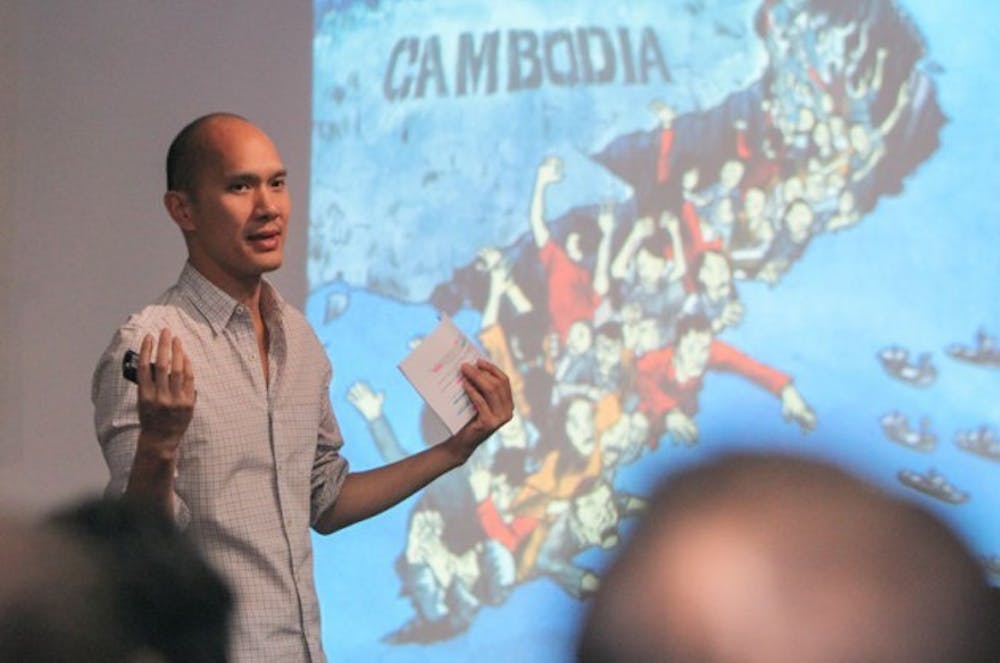Gia-Bao means “a precious treasure passed down from generation to generation” in Vietnamese. But it took G.B. Tran a long time to fully realize what it meant to him and his family.
The lauded illustrator and author spoke Wednesday at UB about his work in an event hosted by the Asian Studies Association.
Tran is an Eisner Industry Award – which is like the Academy Awards of the comic world – nominee for Best Reality-Based Work, as well as a fellowship recipient of The New York Arts Foundation.
Tran is best known for his impressive depiction of his family’s traumatic journey in his graphic novel, “Vietnamerica.”
Tran’s graphic novel gives an admirable depiction of his family’s struggle through war, immigration and his own exploration of the effects both can have on a family.
The novel was made when he was exploring the ties between his family’s legacy and his Americanized identity of the present.
But he was not always so enraptured and inspired by his family’s story – in fact, it was quite the opposite when he was younger.
During the lecture, Tran admitted that his own family heritage was of minimal importance to him during his childhood. His youthful attitude toward his own family legacy was summed up in two words: “Who cares?”
As Tran grew up, that he started to get more curious about his heritage.
The major turning point, he said, was after college, when he was aimlessly living in Brooklyn. Feeling lost, Tran decided to accompany his parents on a trip to Vietnam.
His family had emigrated from Vietnam in 1975, but Tran had never been there.
When he visited Vietnam, he said everything started to change when his parents told him about their experiences.
“I had never gotten the full backstory of my family and their journey. It shocked me, confused me and made me feel proud,” Tran said. “Perhaps now that I have my own child, but I realized how much your parents sacrifice to give you a life of choices.”
Through his experiences in Vietnam, and his newfound appreciation for his family’s history, Tran was inspired to write his now critically acclaimed graphic novel.
After the lecture, Tran fielded questions from the audience, allowing people to come up and talk with him.
Tran emphasized the pillars of his graphic novel to the crowd.
He said there were three themes he wanted to focus on for “Vietnamerica.”
“War and conflict, and how it affects families, immigration and the idea of family legacy and awareness of heritage,” he said.
Peter Yun, a sophomore biochemistry major, said Tran’s story resonated with him and his own experiences.
Yun first encountered Tran when he spoke in Yun’s world civilization class. Yun said his own experiences as an immigrant moved him to see Tran again.
“The story reminded me a lot about how rough it can be to move from another country,” Yun said.
This well-rounded perspective was why Paul McCutcheon, adjunct professor and Asian studies graduate student, assigned Tran’s novel to his Asian American studies class.
“[The book] attempts to get the students to think about diaspora and identity, and negotiating international, local and personal identity,” McCutcheon said. “How we understand ourselves is important, and where we fit into our families is as well.”
McCutcheon said Tran’s lecture was the perfect way to give his students context to “Vietnamerica,” as the backstories of the author would give deeper insight into the book.
Leah Raimondi, an English major and intern for the Asian studies department, said that the Tran’s lecture was so personal – both to him and the audience – and provided a great insight into the author’s life as well as Vietnamese culture.
Themes of immigration and war in “Vietnamerica” didn’t resonate with Raimondi as much as the overriding theme of Tran’s lecture – know your roots and learn as much as you can about yourself as early as you can.
For Raimondi, this meant one thing: “Do what you want now before it’s too late.”
email: arts@ubspectrum.com





